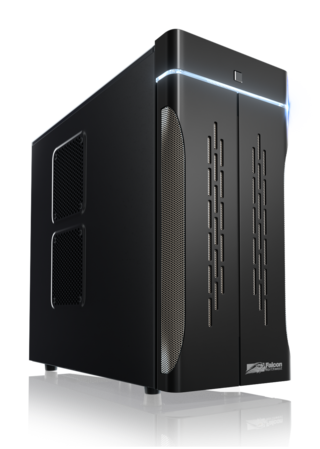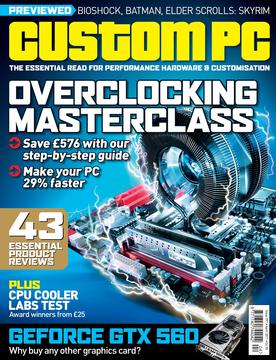
A desktop computer is a personal computer designed for regular use at a stationary location on or near a desk due to its size and power requirements. The most common configuration has a case that houses the power supply, motherboard, disk storage ; a keyboard and mouse for input; and a monitor, speakers, and, often, a printer for output. The case may be oriented horizontally or vertically and placed either underneath, beside, or on top of a desk.

A workstation is a special computer designed for technical or scientific applications. Intended primarily to be used by a single user, they are commonly connected to a local area network and run multi-user operating systems. The term workstation has been used loosely to refer to everything from a mainframe computer terminal to a PC connected to a network, but the most common form refers to the class of hardware offered by several current and defunct companies such as Sun Microsystems, Silicon Graphics, Apollo Computer, DEC, HP, NeXT, and IBM which powered the 3D computer graphics revolution of the late 1990s.

A graphics card is a computer expansion card that generates a feed of graphics output to a display device such as a monitor. Graphics cards are sometimes called discrete or dedicated graphics cards to emphasize their distinction to an integrated graphics processor on the motherboard or the central processing unit (CPU). A graphics processing unit (GPU) that performs the necessary computations is the main component in a graphics card, but the acronym "GPU" is sometimes also used to erroneously refer to the graphics card as a whole.

Mineral oil is any of various colorless, odorless, light mixtures of higher alkanes from a mineral source, particularly a distillate of petroleum, as distinct from usually edible vegetable oils.
A music workstation is an electronic musical instrument providing the facilities of:

Case modification, commonly referred to as case modding, is the modification of a computer case or a video game console chassis. Modifying a computer case in any non-standard way is considered a case mod. Modding is done, particularly by hardware enthusiasts, to show off a computer's apparent power by showing off the internal hardware, and also to make it look aesthetically pleasing to the owner.

A digital audio workstation is an electronic device or application software used for recording, editing and producing audio files. DAWs come in a wide variety of configurations from a single software program on a laptop, to an integrated stand-alone unit, all the way to a highly complex configuration of numerous components controlled by a central computer. Regardless of configuration, modern DAWs have a central interface that allows the user to alter and mix multiple recordings and tracks into a final produced piece.
Convergent Technologies, Inc., was an American computer company formed by a small group of people who left Intel Corporation and Xerox PARC in 1979. Among the founders were CEO Allen Michels, VP Engineering Bob Garrow, head of marketing Kal Hubler, and operating system architect Ben Wegbreit. Convergent was primarily an OEM vendor with their computers resold by other manufacturers such as ADP, AT&T, Burroughs, Four-Phase Systems, Gould, Mohawk, Monroe Data Systems, NCR, and Prime. The company was purchased by Unisys in 1988.

In personal computing, a tower unit, or simply a tower, is a form factor of desktop computer case whose height is much greater than its width, thus having the appearance of an upstanding tower block, as opposed to a traditional "pizza box" computer case whose width is greater than its height and appears lying flat.

Falcon Northwest is a private company headquartered in Medford, Oregon. It designs, assembles, and markets high-end custom computers. The company was founded in 1992 and was one of the first to specialize in PCs built specifically for gaming.
The Acorn Business Computer (ABC) was a series of microcomputers announced at the end of 1983 by the British company Acorn Computers. The series of eight computers was aimed at the business, research and further education markets. Demonstrated at the Personal Computer World Show in September 1984, having been under development for "about a year" and having been undergoing field trials from May 1984, the range "understandably attracted a great deal of attention" and was favourably received by some commentators. The official launch of the range was scheduled for January 1985.

Custom PC was a UK-based computer magazine originally published by Dennis Publishing Ltd and subsequently sold to Raspberry Pi Trading Ltd. It was aimed at PC hardware enthusiasts, covering topics such as modding, overclocking, and PC gaming. The first issue was released in October 2003 and it was published monthly until the final issue, number 235, was released in February 2023.

Arctic Silver Inc. is a privately owned engineering corporation which develops and manufactures thermally conductive compounds and thermal adhesives for the application of heat sinks to high-powered electronic components such as processors, LEDs, chipsets and other electronic devices. Founded in 1999, the company's facilities are located in Visalia, California, US.

A gaming computer, also known as a gaming PC, is a specialized personal computer designed for playing PC games at high standards. They typically differ from mainstream personal computers by using high-performance graphics cards, a high core-count CPU with higher raw performance and higher-performance RAM. Gaming PCs are also used for other demanding tasks such as video editing.
Velocity Micro is a privately held boutique computer manufacturer located in Richmond, Virginia (USA), specializing in custom high-performance gaming computers, professional workstations, and high-performance computer solutions. Its extended product line includes gaming PCs, notebooks, CAD workstations, digital media creation workstations, home and home office PCs, home entertainment media centers, Tesla-based supercomputers, and business solutions. Some products are custom assembled by hand and supported at the company's headquarters.

The history of the personal computer as a mass-market consumer electronic device began with the microcomputer revolution of the 1970s. A personal computer is one intended for interactive individual use, as opposed to a mainframe computer where the end user's requests are filtered through operating staff, or a time-sharing system in which one large processor is shared by many individuals. After the development of the microprocessor, individual personal computers were low enough in cost that they eventually became affordable consumer goods. Early personal computers – generally called microcomputers – were sold often in electronic kit form and in limited numbers, and were of interest mostly to hobbyists and technicians.

A personal computer, often referred to as a PC, is a computer designed for individual use. It is typically used for tasks such as word processing, internet browsing, email, multimedia playback, and gaming. Personal computers are intended to be operated directly by an end user, rather than by a computer expert or technician. Unlike large, costly minicomputers and mainframes, time-sharing by many people at the same time is not used with personal computers. The term home computer has also been used, primarily in the late 1970s and 1980s. The advent of personal computers and the concurrent Digital Revolution have significantly affected the lives of people.

Home computers were a class of microcomputers that entered the market in 1977 and became common during the 1980s. They were marketed to consumers as affordable and accessible computers that, for the first time, were intended for the use of a single, non-technical user. These computers were a distinct market segment that typically cost much less than business, scientific, or engineering-oriented computers of the time, such as those running CP/M or the IBM PC, and were generally less powerful in terms of memory and expandability. However, a home computer often had better graphics and sound than contemporary business computers. Their most common uses were word processing, playing video games, and programming.
InSoft Inc. was an American developer of network-based communications software and multimedia software founded in 1992 in Mechanicsburg, Pennsylvania. The company’s applications included Communique, which is used for desktop collaboration and videoconferencing.
Digital Storm is a privately owned boutique computer manufacturer in the United States that primarily specializes in high-performance gaming desktop and laptop computers. Headquartered in Gilroy, California, the company also sells upgrade components and gaming peripherals, such as headsets, gaming mice, custom keyboards and high-resolution computer monitors.













